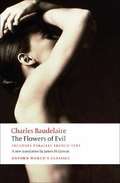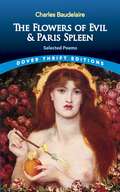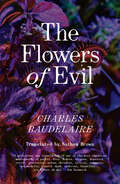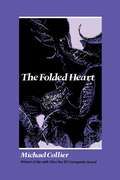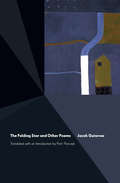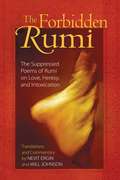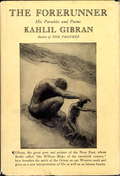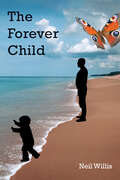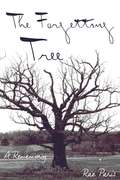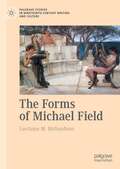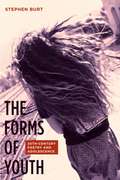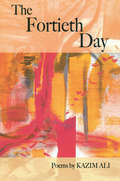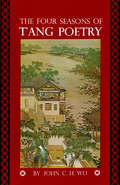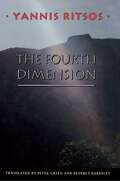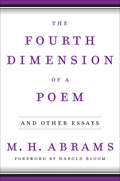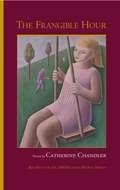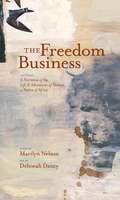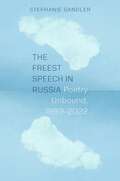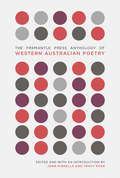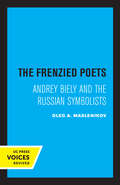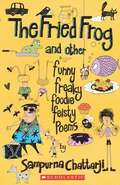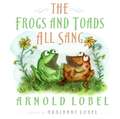- Table View
- List View
The Flowers of Evil
by Jonathan Culler Charles Baudelaire James McgowanThe Flowers of Evil, which T.S. Eliot called the greatest example of modern poetry in any language, shocked the literary world of nineteenth century France with its outspoken portrayal of lesbian love, its linking of sexuality and death, its unremitting irony, and its unflinching celebration of the seamy side of urban life. Including the French texts and comprehensive explanatory notes to the poems, this extraordinary body of love poems restores the six poems originally banned in 1857, revealing the richness and variety of the collection.
The Flowers of Evil & Paris Spleen: Selected Poems (Dover Thrift Editions)
by Charles BaudelaireSex and death, rebellion, corruption -- the themes of Charles Baudelaire's sensual poems sparked outrage upon their 1857 debut. His masterpiece, Flowers of Evil (Les Fleurs du Mal), was dismissed as decadent and obscene and banned in France for nearly a century. Although Baudelaire died in obscurity, today he is recognized as one of the nineteenth century's greatest and most influential poets, whose works were ahead of their time. This unique collection captures the fevered spirit of the transition from Romanticism to Modernism with authoritative interpretations of fifty-one poems from Flowers of Evil. In addition, fourteen prose poems from the posthumously published Paris Spleen offer poignant reflections on the city and its humbler denizens. Noted scholar Wallace Fowlie provides definitive translations of these verses.
The Flowers of Evil: The Definitive English Language Edition
by Charles BaudelaireA DUAL-LANGUAGE EDITION OF THE WORK THAT SCANDALIZED PARIS AND REINVENTED BEAUTYProbing the depths of the modern psyche in a voice at once caustic and vulnerable, melancholic and humorous, Baudelaire&’s infamous book brings to the surface a new understanding of evil, of eroticism, and of social life through an astonishing variety of poetic forms and styles. This edition adds the poems banned from the original 1857 publication to the expanded collection of 1861 and includes an introduction from the translator, acclaimed poetry scholar Nathan Brown.
The Folded Heart (Wesleyan Poetry Series)
by Michael CollierIn his second book, Collier ( The Clasp ) applies a characteristically light touch to profundities: traveling through memory, from conscious to unconscious knowledge, or in physical space that soon acquires figurative dimension, the poet plumbs personal matters of fact that effortlessly outgrow the personal. His narrators seek out the transfiguring moment. In "Spider Tumor," one of the strongest poems, a visit to a childhood friend brings a luminously clarifying encounter with death and the understanding that this meeting is only one of many the future holds for the narrator, while in "The Lights," a boy notices the way ivy "feet" have left tracks on a brick wall in "a pattern radiating / like a corner of a galaxy." Looking but not straining for inherent "patterns" in his subjects, Collier writes with selfless grace about experience; his personas are elegantly unassuming. In his work, "the earth's / powdery talc obscures our keen desires with time," but a reckoning with those desires is still necessary, even if in conclusion one finds "twenty years have passed and I feel / the absence of something / I never held."
The Folding Star: and Other Poems (Lannan Translations Selection Series)
by Jacek Gutorow"We are fortunate to now have them in English so that we who don't read Polish can now read these, and enjoy their insight and wry wit."--Mary Jo BangIn his triumphant collection The Folding Star and Other Poems, poet of the imagination Jacek Gutorow offers thirty-one gems that that will help change our understanding of Polish poetry.Jacek Gutorow has been nominated for the Nike Award, the Cogito Award, and the Gdynia Award. He teaches at the University of Opole.Piotr Florczyk has taught at the University of Delaware, Antioch University Los Angeles, and University of California-Riverside. He lives in Los Angeles, California.
The Forbidden Rumi: The Suppressed Poems of Rumi on Love, Heresy, and Intoxication
by Will Johnson Nevit O. ErginThe first collection of poems translated into English from the forbidden volume of the Divan of Rumi• Presents Rumi’s most heretical and free-form poems• Includes introductions and commentary that provide both 13th-century context and modern interpretationAfter his overwhelming and life-altering encounters with Shams of Tabriz, Rumi, the great thirteenth-century mystic, poet, and originator of the whirling dervishes, let go of many of the precepts of formal religion, insisting that only a complete personal dissolving into the larger energies of God could provide the satisfaction that the heart so desperately seeks. He began to speak spontaneously in the language of poetry, and his followers compiled his 44,000 verses into 23 volumes, collectively called the Divan.When Nevit Ergin decided to translate the Divan of Rumi into English, he enlisted the help of the Turkish government, which was happy to participate. The first 22 volumes were published without difficulty, but the government withdrew its support and refused to participate in the publication of the final volume due to its openly heretical nature. Now, in The Forbidden Rumi, Will Johnson and Nevit Ergin present for the first time in English Rumi’s poems from this forbidden volume. The collection is grouped into three sections: songs to Shams and God, songs of heresy, and songs of advice and admonition. In them Rumi explains that in order to transform our consciousness, we must let go of ingrained habits and embrace new ones. In short, we must become heretics.
The Forerunner
by Kahlil Gibran"You are your own forerunner, and the towers you have builded are but the foundation of your own giant-self. And that self too shall be a foundation.""And I too am my own forerunner, for the long shadow stretching before me at sunrise shall gather under my feet at the noon hour. Yet another sunrise shall lay another shadow before me, and that also shall be gathered at another noon.""Always have we been our own forerunners, and always shall we be. And all that we have gathered and shall gather shall be but seeds for fields yet unploughed. We are the fields and the ploughmen, the gatherers an the gathered."
The Forever Child
by Neil WillisThe Forever Child is a contemplative fourth offering from an author shaped by personal loss. In this reflective journey, the writer poetically navigates through memories of childhood and the contrasts of adulthood, examining how external influences have moulded his life. Amidst the backdrop of nature’s healing embrace, he clings to the beauty of dreams while confronting life’s traumas. Though composed of distinct pieces, The Forever Child is best experienced in its entirety, from the first page to the last.
The Forgetting Tree: A Rememory
by Rae ParisRae Paris began writing The Forgetting Tree: A Rememory in 2010, while traveling the United States, visiting sites of racial trauma, horror, and defiance. The desire to do this work came from being a child of parents born and raised in New Orleans during segregation, who ultimately left for California in the late 1950s. After the death of her father in 2011, the fiction Paris had been writing gave way to poetry and short prose, which were heavily influenced by the questions she’d long been considering about narrative, power, memory, and freedom. The need to write this story became even more personal and pressing. While Paris sometimes uses the genre of “memoir” or “hybrid memoir” when referring to her work, in this case the term “rememory,” born from Toni Morrison’s Beloved, feels most accurate. Paris is driven by the familial and historical spaces and by what happens when we remember seemingly disparate images and moments. The book’s three sections are motivated by the ongoing movement for black lives—with the headings “Bones,” “Bodies,” and “Souls.” Paris’s writing is raw and unapologetic as it delves into a history shaped by stories of terror and resistance. The collection is not fully prose or poetry, but more of an extended funeral program or a prayer for those who have passed through us. A perfect blending of prose, poetry, and images, The Forgetting Tree is a unique and thought-provoking collection that argues for a deeper understanding of past and present so that we might imagine a more hopeful, sustainable, and loving future.
The Forms of Michael Field (Palgrave Studies in Nineteenth-Century Writing and Culture)
by LeeAnne M. RichardsonMichael Field, the poetic identity created by Katharine Bradley (1846-1914) and her niece Edith Cooper (1862-1913), ceaselessly experimented with forms of identity and forms of literary expression. The Forms of Michael Field argues that their modes of self-creation are analogous to their poetic creations, and that exploring them in tandem is the best way to understand Michael Field’s cultural and literary importance. Michael Field deploys a different form in each volume of their lyric poetry: translations of Sappho, ekphrasis, songs, sonnets, and devotional verse. They also appropriate and revise the dramatic genres of verse tragedy and the masque. Each of these experiments in form enable Michael Field to differently address the cultural questions that beset late-Victorian women writers. Drawing on the insights of new lyric studies and new formalism, this book analyzes Michael Field’s continual quest for the aesthetic forms that best express their evolving ideas about identity and sexuality, gender and sacrifice, lyric voice and authority.
The Forms of Youth: Twentieth-Century Poetry and Adolescence
by Stephanie BurtEarly in the twentieth century, Americans and other English-speaking nations began to regard adolescence as a separate phase of life. Associated with uncertainty, inwardness, instability, and sexual energy, adolescence acquired its own tastes, habits, subcultures, slang, economic interests, and art forms. This new idea of adolescence became the driving force behind some of the modern era's most original poetry.Stephen Burt demonstrates how adolescence supplied the inspiration, and at times the formal principles, on which many twentieth-century poets founded their works. William Carlos Williams and his contemporaries fashioned their American verse in response to the idealization of new kinds of youth in the 1910s and 1920s. W. H. Auden's early work, Philip Larkin's verse, Thom Gunn's transatlantic poetry, and Basil Bunting's late-modernist masterpiece, Briggflatts, all track the development of adolescence in Britain as it moved from the private space of elite schools to the urban public space of sixties subcultures. The diversity of American poetry from the Second World War to the end of the sixties illuminates poets' reactions to the idea that teenagers, juvenile delinquents, hippies, and student radicals might, for better or worse, transform the nation. George Oppen, Gwendolyn Brooks, and Robert Lowell in particular built and rebuilt their sixties styles in reaction to changing concepts of youth. Contemporary poets continue to fashion new ideas of youth. Laura Kasischke and Jorie Graham focus on the discoveries of a specifically female adolescence. The Irish poet Paul Muldoon and the Australian poet John Tranter use teenage perspectives to represent a postmodernist uncertainty. Other poets have rejected traditional and modern ideas of adolescence, preferring instead to view this age as a reflection of the uncertainties and restricted tastes of the way we live now. The first comprehensive study of adolescence in twentieth-century poetry, The Forms of Youth recasts the history of how English-speaking cultures began to view this phase of life as a valuable state of consciousness, if not the very essence of a Western identity.
The Forms of Youth: Twentieth-Century Poetry and Adolescence
by Stephen BurtEarly in the twentieth century, Americans and other English-speaking nations began to regard adolescence as a separate phase of life. Associated with uncertainty, inwardness, instability, and sexual energy, adolescence acquired its own tastes, habits, subcultures, slang, economic interests, and art forms. This new idea of adolescence became the driving force behind some of the modern era's most original poetry. Stephen Burt demonstrates how adolescence supplied the inspiration, and at times the formal principles, on which many twentieth-century poets founded their works. William Carlos Williams and his contemporaries fashioned their American verse in response to the idealization of new kinds of youth in the 1910s and 1920s. W. H. Auden's early work, Philip Larkin's verse, Thom Gunn's transatlantic poetry, and Basil Bunting's late-modernist masterpiece, Briggflatts, all track the development of adolescence in Britain as it moved from the private space of elite schools to the urban public space of sixties subcultures. The diversity of American poetry from the Second World War to the end of the sixties illuminates poets' reactions to the idea that teenagers, juvenile delinquents, hippies, and student radicals might, for better or worse, transform the nation. George Oppen, Gwendolyn Brooks, and Robert Lowell in particular built and rebuilt their sixties styles in reaction to changing concepts of youth. Contemporary poets continue to fashion new ideas of youth. Laura Kasischke and Jorie Graham focus on the discoveries of a specifically female adolescence. The Irish poet Paul Muldoon and the Australian poet John Tranter use teenage perspectives to represent a postmodernist uncertainty. Other poets have rejected traditional and modern ideas of adolescence, preferring instead to view this age as a reflection of the uncertainties and restricted tastes of the way we live now. The first comprehensive study of adolescence in twentieth-century poetry, The Forms of Youth recasts the history of how English-speaking cultures began to view this phase of life as a valuable state of consciousness, if not the very essence of a Western identity.
The Fortieth Day (American Poets Continuum)
by Kazim AliFrom the Bible to the Quaraan, the fortieth day symbolizes the last moment before deliverance, a moment in time when a supplicant or prophet or stormbeaten passenger knows there is no state &“after,&” but finally accepts the present state as a permanent one.In The Fortieth Day, Kazim Ali follows the fractured narratives and moving lyrics of his debut collection, The Far Mosque, with a deeply spiritual and meditative book exploring the rhetoric of prayer.Kazim Ali was born in the United Kingdom and raised in an Islamic household. He holds degrees from the University at Albany and New York University. He lives in Oberlin, Ohio.
The Fortunes Of Poetry In An Age Of Unmaking
by James WilsonIn The Fortunes of Poetry in an Age of Unmaking, James Matthew Wilson demolishes the bankruptcy and pretensions of much contemporary poetry and literary scholarship. Though he offers many illustrations of the sometimes hilarious absurdities that have overtaken our literary culture, he does not settle for mere criticism or mirth. Rather, Wilson's study offers us nothing less than a renewed philosophy of poetry and literary criticism, one that accounts for poetry's historical distinction as the "paradigmatic art form" and shows us a way forward to its renewal and restoration in this otherwise dreary "age of unmaking."
The Four Seasons of T'ang Poetry
by John C.H. WuThe poets of ancient China were singing their songs to the 20th century, indeed for all time, and Dr. Wu, with the soul of a poet himself, interprets them with deep understanding. He knows the singers as they worked in the fields of millet, repaired the river dikes, or gathered marshmallows at the time of the Ch'ing Ming Festival, and faithfully records their emotions.Dr. Wu feels that the T'ang poetry, like the soul of universal man, falls naturally into four seasons. Because of his broad humanity and meticulous craftsmanship, many Chinese consider him their greatest poet.
The Fourth Dimension (Princeton Modern Greek Studies #39)
by Yannis RitsosIn the dramatic monologues that make up The Fourth Dimension--especially those based on the grim history of Mycenae and its royal protagonists--the celebrated modern Greek poet Yannis Ritsos presents a timeless poetic paradigm of the condition of Greece, past and present. The volume also contains a group of modern narratives, including the famous, and much-anthologized, "Moonlight Sonata." Ritsos, rightly, regarded the The Fourth Dimension as his finest achievement. It is now presented to English- speaking readers for the first time in its entirety. From "Philoctetes" All the speeches of great men, about the dead and about heroes. Astonishing, awesome words, pursued us even in our sleep, slipping beneath closed doors, from the banqueting hallwhere glasses and voices sparkled, and the veilof an unseen dancer rippled silentlylike a diaphanous, whirling wallbetween life and death. This throbbingour childhood nights, lightening the shadows of shieldsetched on white walls by slow moonlight.
The Fourth Dimension of a Poem: and Other Essays
by Harold Bloom M. H. AbramsA new collection of essays by the legendary literary scholar and critic. In the year of his one-hundredth birthday, preeminent literary critic, scholar, and teacher M. H. Abrams brings us a collection of nine new and recent essays that challenge the reader to think about poetry in new ways. In these essays, three of them never before published, Abrams engages afresh with pivotal figures in intellectual and literary history, among them Kant, Keats, and Hazlitt. The centerpiece of the volume is Abrams's eloquent and incisive essay "The Fourth Dimension of a Poem" on the pleasure of reading poems aloud, accompanied by online recordings of Abrams's revelatory readings of poems such as William Wordsworth's "Surprised by Joy," Alfred Tennyson's "Here Sleeps the Crimson Petal," and Ernest Dowson's "Cynara." The collection begins with a foreword by Abrams's former student Harold Bloom.
The Frangible Hour: Poems
by Catherine ChandlerThe poems in Catherine Chandler's The Frangible Hour are woven together like a tapestry, balanced between loss and hope. Though many of the poems are parts of a series, everything feels linked: for example, in poems like "For Melina, 8, Sleeping," the poet explores one perfect, beautiful moment of innocence, a child's belief in Santa. The narrator, though, can't leave the scene before acknowledging that the world will eventually betray that the world is not so magical. But The Frangible Hour looks as unflinchingly at the joy as the sorrow: Chandler forces herself towards finding the good "in what [she's] got."
The Freedom Business: Including A Narrative Of The Life And Adventures Of Venture, A Native Of Africa
by Marilyn NelsonThe true narrative of a slave from Africa, crafted in verse by Marilyn Nelson. Born an African prince, Broteer Furro was captured by slave traders at age six. As he stepped onto a cargo ship, the vessel's steward purchased the boy and gave him a new name: Venture. He landed in Rhode Island and worked through a lifetime of slavery to buy not only his own freedom but the freedom of his wife and children. Remarkable in his own time for his ambition and physical stature, Venture Smith became history's first man to document both his capture from Africa and life as an American slave. In this breathtaking volume, Marilyn Nelson's poems sit opposite the text of Smith's own narrative. Nelson's controlled verse layers this edition with insight into Smith's stoic eighteenth-century prose. Deborah Dancy's stark watercolor collages highlight the tension between the economical language of the narrative and the turbulent emotion within the poems.
The Freest Speech in Russia: Poetry Unbound, 1989–2022
by Stephanie SandlerThe first English-language study of contemporary Russian poetry and its embrace of freedom—formally, thematically, and spirituallySince 1989 and the fall of the Berlin Wall, Russian poetry has exuded a powerful awareness of freedom, both aesthetic and political. No longer confined to the cultural underground, poets reacted with immediacy to events in the world. In The Freest Speech in Russia, Stephanie Sandler offers the first English-language study of contemporary Russian poetry, showing how these poems both express and exemplify freedom.This period was a time of great poetic flourishing for Russian poets, whether they remained in Russia or lived elsewhere. Sandler examines the work of dozens of poets—including Gennady Aygi, Joseph Brodsky, Grigory Dashevsky, Arkady Dragomoshchenko, Mikhail Eremin, Elena Fanailova, Anna Glazova, Elizaveta Mnatsakanova, Olga Sedakova, Elena Shvarts, and Maria Stepanova—analyzing their engagement with politics, performance, music, photography, and religious thought, and with poetic forms small and large. Each chapter investigates one of these topics, with extensive quotation from the poetry, including translations of all texts into English.In an afterword, Sandler considers poets&’ responses to Russia&’s war on Ukraine and the clampdown on free expression. Many have left Russia, but their work persists, and they remain vocal opponents of domestic political oppression and international violence.
The Fremantle Press Anthology of Western Australian Poetry
by John Kinsella Tracy RyanThe Fremantle Press Anthology of Western Australian Poetry is a comprehensive survey of the state's poets from the 19th century to today. Featuring work from 134 poets, and including the work of many WA Indigenous poets, this watershed anthology brings together the poems that have contributed to and defined the ways that Western Australians see themselves.
The Frenzied Poets: Andrey Biely and the Russian Symbolists
by Oleg A. MaslenikovThis title is part of UC Press's Voices Revived program, which commemorates University of California Press’s mission to seek out and cultivate the brightest minds and give them voice, reach, and impact. Drawing on a backlist dating to 1893, Voices Revived makes high-quality, peer-reviewed scholarship accessible once again using print-on-demand technology. This title was originally published in 1952.
The Fried Frog and Other Funny Freaky Foodie Feisty Poems
by Sampurna ChattarjiPoems for different seasons and ages.
The Friendly Beasts
by Tomie dePaola"The simple strains of this old Christmas melody are superbly reflected in the graceful, delicate, yet strong images that dePaola brings to the page....A Christmas remembrance to be long treasured." -- Booklist (starred review)"Beautiful." -- The Horn Book"Meticulous attention has been paid to every detail of design, color, and layout." -- School Library Journal
The Frogs And Toads All Sang
by Arnold LobelPresents a linked collection of ten short stories in rhyme featuring frogs, toads, and polliwogs.
